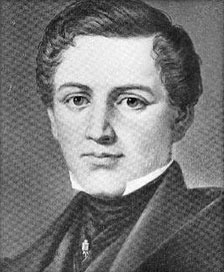Wilhelm Hauff, Wilhelm Gauff, German. Wilhelm Hauff, November 29, 1802, Stuttgart – November 18, 1827, there – German writer and short story writer, representative of the Biedermeier movement in literature, doctor of philosophy and theology.
W. Gauff’s literary heritage consists of three collections of fairy tales, one of which was published after the author’s death by his widow, as well as several novels and poems. W. Gauff was a member of the Swabian poets. These works forever inscribed the name of Wilhelm Hauff in the history of world literature. Many of his mystical, sometimes scary, sometimes sad tales are imbued with the spirit of the Middle East. He is one of those few authors who knew how to make a masterpiece out of ordinary legends about ghosts and the poor punishing the evil rich – magical, bright, exciting, memorable stories that are still read with enthusiasm by both children and adults. The Wilhelm Hauff Fairy Tale Museum has been operating in Baiersbronn (Baden-Württemberg) since 1997.
Biography
Wilhelm Hauff was born on November 29, 1802 in Stuttgart, the son of August Friedrich Hauff, who served as secretary in the Foreign Office of Württemberg, and Jadwiga Wilhelmina Elsässer Hauff. Of four children, he was the second oldest. In 1809, when Wilhelm was seven years old, his father died suddenly, and his mother, taking the children, moved to the university city of Tübingen. There, in the house of his maternal grandfather, Gauff spent his youth. The very first education that the boy received was reading books from his grandfather’s huge library. In 1818 he was sent to study at a monastery school, and two years later he entered the University of Tübingen. Four years later he graduated from the university with a doctorate in philosophy and theology.
After receiving his education, Hauff got a job as a tutor in the family of the Württemberg Minister of War, General Baron Ernst von Hügel, and became a mentor to his children. Together with this family, he traveled to France and became acquainted with the German states of the northern and central parts of Germany with great interest. During his short life, he visited Paris, Brussels, Antwerp, visited Kassel, the homeland of the Brothers Grimm, Bremen, a topographically accurate description of which we find in one of his last short stories “Phantasmagoria in the Bremen Wine Cellar”, visited Berlin, Leipzig, Dresden.
It was for the children of Baron von Hügel that his Märchen were written – fairy tales, which were first published in the “Almanac of Fairy Tales of January 1826 for the Sons and Daughters of the Noble Classes.” It included such works as “Little Muk”, “The Caliph the Stork” and others, which immediately gained unprecedented popularity in all countries where German was spoken and read. In Russia, Gauff became known primarily for his stories, translated and revised by Vissarion Belinsky, such as “Othello” and “The Beggar Woman from the Pont des Arts.”
In the same 1826, he wrote the first part of the novel “Pages of Satan’s Memoirs” (Mitteilungen aus den Memoiren des Satan) and “The Man from the Moon” (Der Mann im Mond). The first novel was written in the spirit of Hoffmann’s so-called fragmentary prose, which Gauff perfectly mastered and further developed. Many critics note that although the student (Gauf) was inferior to his “literary teacher” (Hoffmann) in the richness of language, he was noticeably ahead of him in the variety of plots and the unsurpassed mysticism of his works.
The novel “The Man in the Moon” was written as a parody of sentimental short stories by the then famous German author Heinrich Clauren. In retaliation, Clauren launched a kind of attack on all of Gauff’s work. Gauff responded by writing a sarcastic novella, “H. Clauren’s Controversial Sermon on the Man in the Moon,” in which he outlined his views on the mawkish and unhealthy literature with which Clauren had flooded the country.
Inspired by the novels of Walter Scott, Gauff wrote the historical novel Liechtenstein (1826), which became one of the best novels of this genre in the 19th century. This work, on the pages of which the adventures of heroes were described during the era of the Peasants’ War, which engulfed Germany in the 16th century, gained enormous popularity in Germany, and especially in the lands of Swabia, because it tells about one of the most interesting moments in the history of this region.
During his travels, Gauff also completed “Memoirs of Satan” and published several short stories, as well as poems, which very quickly became folk songs.
In January 1827, Hauff took up the position of editor of the Stuttgart morning newspaper and married his cousin Louise Hauff, with whom he had been in love since childhood. That same year, on November 10, their daughter Wilhelmina was born. However, the couple’s happiness was short-lived. Wilhelm Hauff went to the Alps in search of material for a new novel, conceived as a stylistic continuation of Liechtenstein, but on the way he became seriously ill and was forced to interrupt the trip. Returning home, he died of typhoid fever on November 18, 11 days short of his 25th birthday and having been a happy father for only 8 days.
One of Hauff’s admirers, Duke Wilhelm von Urach, was especially impressed by his historical novel; in 1840-1842, based on the author’s descriptions, he built Lichtenstein Castle on the foundations of a 1390 castle in the town of Honau, in the commune of Lichtenstein in Baden-Württemberg. Not far from the castle there is a monument to the writer.
